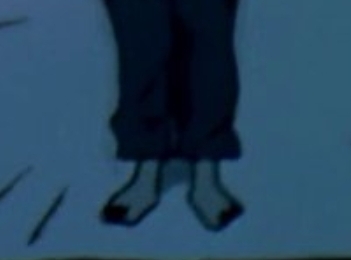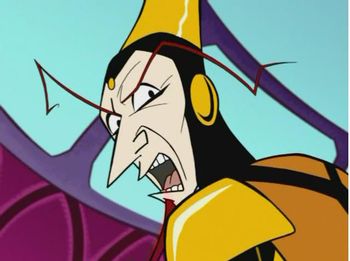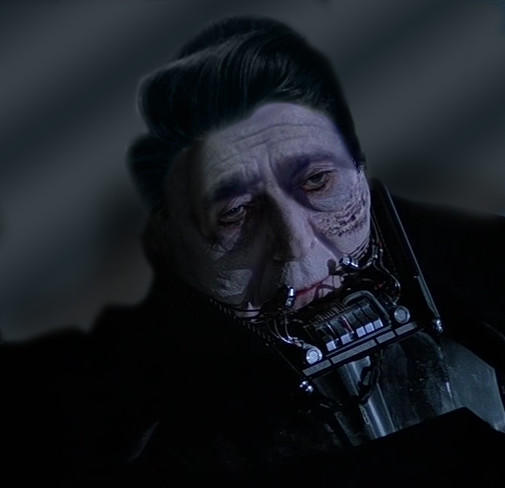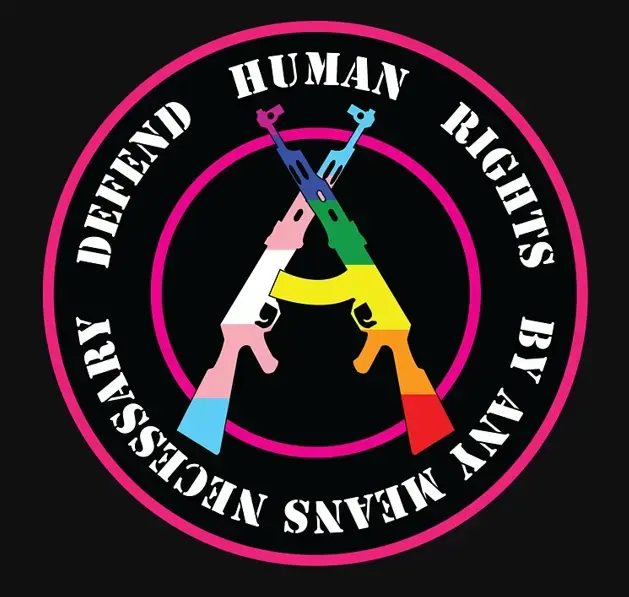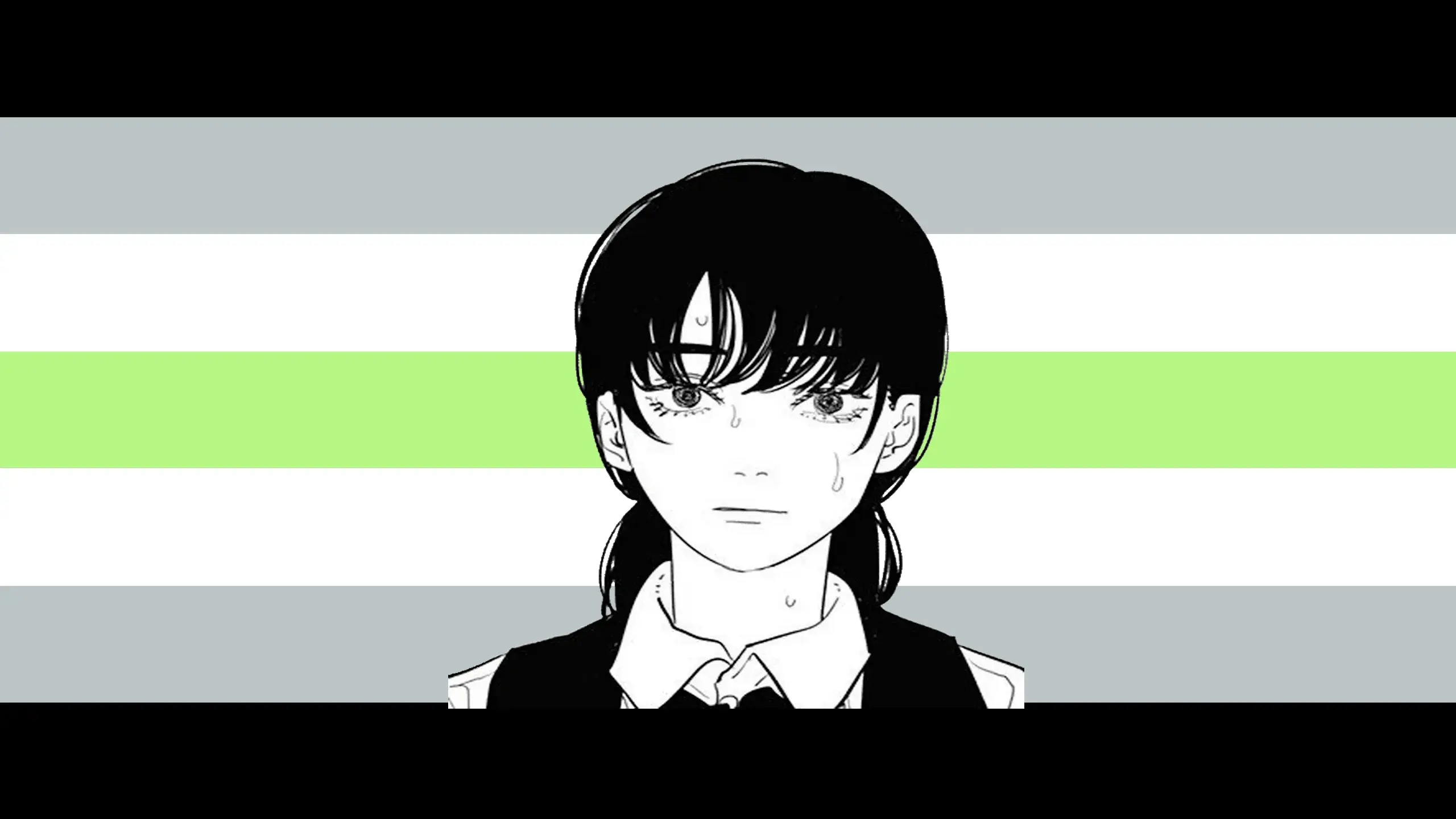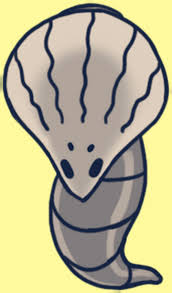One of the things I hate is (usually amateur stuff on YouTube) in which the person is getting overly scared even when it makes no sense.
Like they'll over act and start hyperventilating at a leaf and saying shit like "Oh my god what is that?!?!?! WHAT IS THAT?!?!" at like...a thud in the distance.
YouTube and Ghost Hunting shows seem to be the worst offender.
Another trope I hate is a horror game one but it's somewhat related; I hate it when the game tells you when to be scared by having a "sanity" effect or by the player character gasp or scream or whatever. Worst is if they have some kind of heartbeat sound effect that plays when you're supposed to be spooked.
But yeah, if a character starts saying shit like "WhAt ThE FuCk WaS ThAt?!" then I just get more annoyed than scared.
Characters being unconvincingly incompetent or foolish. Alien and Aliens are some of my favorite horror movies to this day because the characters behave in a consistent and believable fashion based on who they are and what they know. The space truckers aren't at all equipped to handle the situation but they apply their knowledge as best they can. The marines are totally absorbed in their self image as gung ho badasses and so wildly underestimate their enemy while making foolish but believable decisions.
Basically; I like when the characters behave competently and lose not because the writer's made them carry the idiot ball and behave foolishly, but because the threat overwhelmed their competence and resourcefulness. It makes the threat more legitimately frightening; these peopkle did their best and were still wiped out, so hwo could I expect to do better?
well put. much better articulated than I would have.
Extreme skepticism/refusal to believe what's happening.
I'm an absolutely annoying skeptic, never seen anything i would consider paranormal in the slightest.
People in horror movies will see something completely fucking bonkers and still be 20 movie minutes from believing the one character who says there's a problem. I can't think of any examples right now but especially when a child continually describes horrible things happening and the parents say "is just a series of bad dreams that are escalating and oddly coherent" like buddy at least spend a few nights in their bed to see what's going on
As a Marxist I subscribe to a materialist worldview and therefore have no belief in ghosts whatsoever, but if my furniture started floating I would run screaming from the house
Exactly. Guess what the couch materially flipped over 4 times and all the pots and pans materially flew out of the cupboard so I'm materially getting the fuck out
But like after you calm down, you probably start thinking of ways to make furniture float (or your daughter's head spinning in circles while she vomits everywhere). There should be some explanation for what's happening, even if it's a supernatural one.
This trope is silly because no one thinks to experiment or investigate. Okay, so my child is possessed. Clearly some things we thought about the world are wrong. But you'd think people would be ask questions like "How does possession occur? Are there ways to prevent it? Where do the demons come from and how does culture change our interactions with them?"
For real! My fundamental understanding of the world has been broken, time to learn. "Ok so if it can manipulate objects, is it just avoiding touching me when it's not causing Havok?" You know, next time the couch lifts up have a jar of flour and throw it around to see if it's just an invisible guy being a dick.
There's a comedy script somewhere in here about a ghost realizing far too late that the young professional that just moved into the house its haunting is a lab assistant hungry for grant money whose response to seeing her furniture float is to start fantasizing about the Nobel prize she's about to win.
The moment she realizes the spirit is trapped in the house she immediately starts setting up an exact perimeter of ghost territory and setting it up like a containment area
I have so much hatred for "The front room" and they were egregious in this troupe .
Guy: by the way my grandma is pretty racist
Black wife: I don't believe you(?? Literally what black person says this)
racist things happen
Black wife: you're right she is racist
Guy: no she isn't, it's all in your head
Oh yeah the character who starts skeptical becomes a believer based on evidence and is derided for it.
Yeah I hate this one. It's probably my least favorite, too. You'd think with the SCP Foundation being over a decade old at this point, writers would realize you can do some creepy shit with the scientific method, skepticism, and experiments.
For example, let's say a house is haunted. Some science nerds go to the house to start investigating how the house became haunted and they conduct a study the same way you'd study animals in the wild. Lions are still really fucking scary when they rip your colleague's head off when something supposed to protect them didn't work.
It's also one of the ways that unintentionally makes characters unlikable. We, the audience, know the protagonist is experiencing something real. Then having some asshole brush them off (especially a man being skeptical of his wife) just makes us frustrated with the film as a film and not with the plot. It Follows was great because even though only one person could see the monster at a time, everyone who cared about the protagonist believed her that she was experiencing something irregular.
It follows is a good example of characters having their decision making affected by the stress of the situation but also acting rationally and seemingly caring about their friends and family
Eternal Darkness broke the mold on sanity effects in console games. The only thing that's compared to that for me, since then, was haptic vest heartbeat effects in Half Life Alyx.
Anyway, least favorite trope is the racist black guy first to die trope. Followed by whomever had sex. Seems prudish.
lol, it's just USA as a Horror Genre. Maybe throw in that it's all on an Native American Burial ground to really cement the hierarchy of marginalized peoples.
Don't forget the bad guy has to be disabled. Physically deformed, neurodivergent, something that somehow translates to them being evil.
CW transmedicalism
Alternatively, the character can be clearly coded as a closeted trans woman, but then you need to have some psychiatrist lecture people "no, this is actually not a transs***al, but somebody who is only consumed completely by dreams of living as a woman full-time because of this contrived fetish that nobody has ever heard of before (because i just made it up)."
Yes, this means that Ray Blanchard is literally Hanibal Lecter if Hanibal Lecter was a complete idiot.
The movie, Bone Tomahawk, takes this one step further and has a Native American man talk to a group of white people and tells them "these aren't real Native Americans you're up against." I was expecting eldritch horrors with tentacles and bird heads who spit acid or some shit. Nope! Just some cannibals coming to steal white women!
At least we got to see a settler cleaved in half from crotch to head, so that was nice. Really fucking weird decision to do the "not really trans" trope combined with a racism.
Eternal Darkness was so, so good. Just amazing. It deserves a re-make so a new generation can experience the absolute bonkers terror of it.
I was in college when it came out and we legit stacked couches on tables to make stadium seating and had like twenty people watching someone play like it was a horror movie in a theare. Whenever some new mind-screw faked everyone out the whole audience would start shrieking and going omg omg omg. It was a wonderful experience.
Lol, that sounds awesome. I rented that shit from blockbuster and it became a test of bravery to see how long I could play it with the lights off.
Using music or loud sounds to startle, it's the definition of cheap and hackery
Seemingly unkillable monster that has, for the entire film, proven itself to be unkillable gets "killed" only to murder the person who is standing ontop of the dead/not dead monster while looking back at the rest of the group.
Like, seriously, you know the thing isn't easy to kill. Why suddenly lose all sense of self preservation and paranoia about the monster's leathal state?
Honorable mention to the "unecessary sacrifice" where a character "bravely" stands in the way of the monster (who tears through them like tissue paper) instead of running away to give the rest of the characters something like .001 second more time to run away.
Honorable mention to the "unecessary sacrifice" where a character "bravely" stands in the way of the monster (who tears through them like tissue paper) instead of running away to give the rest of the characters something like .001 second more time to run away.
And they have to stand there arguing about it for a solid minute before running.
And when it actually happens, they have to stand there in horror yelling "No!" Or "(Character Name!)"
yeah the only way to do this believably is to have (char name)'s death make a meaningful delay possible while maintaining tension throughout their escape from danger, and later when the adrenaline subsides you show them having to process the loss of (char name)
The ritual of hear noise/turn around/see nothing/sigh of relief/turn back/die
I can easily imagine that it was once a masterstroke of tension-building, because otherwise every movie for 50 years wouldn't have copied it. But now it's so easy to see coming that it actually flatlines all tension and leaves me knowing exactly what will happen and just waiting for the formalities to occur.
I can easily imagine that it was once a masterstroke of tension-building
Similar to the "Cat Scare." I see alot of people griping about fakeout jump scares itt, but it was a great idea and novel trick in referring to notecard 1942 when it first appeared.
I don't expect perfect competence from a fictional person who is supposed to be a regular person in a a stressful situation, but when the incompetence is too extreme, especially in the form of obviously unnecessary risks that terror would probably work to dissuade you from, it's hard for me to handle.
In Guillermo del Toro's remake of Don't Be Afraid of the Dark, the little girl is aware of the tiny monsters living in the house and repeatedly tells her father and stepmother about them, they disregard her words for most of the movie, but eventually realize that she's telling the truth and leave the dilapidated old mansion that her father is renovating in a panic.
They plan to go to a hotel for the night. Since the creatures can't survive in the daylight, they can safely return to gather their things the following day, But instead of having the entire group run to the car together and then just booking it, they tranquilize the little girl, forcing one of the parents to carry her at all times, and when they get close to the car, one of them decides that it's imperative to get her favorite blanket or pillow or stuffed animal. I can't remember. It's been a long time. Anyways, they run back into the house to get it. Why would you go back into the house. This ultimately leads to one of the parents getting killed by the creatures.
To be fair, after reading your reply, that shit 100% happens in the movie I referenced.
Hate it so much. You're not even interested in what's happening?
Sorry I don't follow the horror genre too closely. But it seems like, for many of their films, they hire really young actresses who have never had a major role (which honestly is fine by itself). And then revel in the stress of said really young women.
Maybe somebody who follows this more closely can correct me.
Pick me up I'm scared has a good 4 part series on the politics of horror. Originally horror and sexuality went hand in hand, espeically the 70s-80s slasher era. So young scared (likely white) women is "tradition".
No it's a recurring theme in horror to the point there's horror movies deliberately dunking on the trope. Off the top of my head:
- Always Shine (2016)
- Cabin in the Woods (2011)
- Hereditary (2018)
(Although Hereditary is more about avoiding it by having the protagonist be a middle aged woman). There's also the Weinstein shit, too. Hire young actresses, then tell them to get naked or they're fired. But of course we have a Madonna-whore complex, so usually those young actresses can only get smut roles as long as they're young and attractive, which further reduces their ability to get serious roles. A lot of experienced actresses have talked about the problem, especially during Me Too (before then as well, just not taken seriously).
just want to mention that this trope allows someone (usu. het men) of any age or suitability to imagine gaining sexual access to the heroine via saving her from the threat
Do not care for needless "Lore"
Like, with Freddy Krueger, being a child murderer gruesomely killed in an act of vigilant violence was enough
Then we get the "Actually, he's the bastard son of a hundred madmen, that's why he was evil" and it's like, are you for real?
It makes horror less scary when you explain it so much!
I'd argue that (extensive) worldbuilding is generally overvalued.
Good worldbuilding must always deepen the implications of the setting, never answer questions directly but hint and create even more questions than before, it has to make the main cast feel small and insignificant so when they triumph their accomplishments resonate that much more
Good lore is a process of asking questions and creating mysteries, but not solving them, unless that process itself creates more questions and mystery
never answer questions directly but hint and create even more questions than before, it has to make the main cast feel small and insignificant so when they triumph their accomplishments resonate that much more
Disregarding my point, I think that this is an incredibly narrow view of an artistic tool.
If anything, worldbuilding does not make a compelling narrative on its own. It can tickle one's brain with concepts of some narratives, but almost never anything more than that, I'd argue.
I do think that worldbuilding's primary purpose should be to elevate the rest of a given narrative. Worldbuilding itself can even be harmed if it means achieving that effect, I would argue, though, as it is ultimately not important.Depends on the type of story someone is telling, some can thrive on characterization with the setting simply being an afterthought (12 Angry Men being an example), and worldbuilding without effective characterization taking advantage of the setting, is simply wasted and vice versa
But if you're going to have worldbuilding and a setting that isn't simply wallpaper, then the points I made are absolutely crucial, not everyone is a natural genius at characterization, and for authors who know their limits, worldbuilding and lore-crafting offers a way to expand their vision and realize potential they may not reach thru dialogue and character writing alone, Iain Banks is a famous example and George R.R. Martin is a typical case of someone who understands this dynamic despite excelling at characterization, and unless you're a highly skilled author it's not enough to simply have characters, but the world they inhabit has to feel alive and bigger than them
As you said, the purpose of lore should be to elevate a given narrative, but that process requires more than simply "tickling" the brain; mystique, grandeur, awe, wonder, terror, these are emotions where characterization invariably meets the implications of the setting thru implied/explicit mystery and questions inevitably asked by the audience, and I've seen so many stories where authors fail to recognize that inflection point and end up with convoluted untethered characterization, dead empty settings or worse both
But if you're going to have worldbuilding and a setting that isn't simply wallpaper
What does it mean for a setting to 'not be a wallpaper'?
then the points I made are absolutely crucial
I strongly disagree. This seems like it is extremely narrow to consider worldbuilding as only being useful for instilling the sense of main characters of a narrative to feel small and insignificant. What would prevent you from, for example, using worldbuilding to create parallels with real-world anti-colonial struggles and making a narrative about gloom or bloom in a colonial environment?
Why specifically have worldbuilding specifically for making main characters 'feel small and insignificant' when you can (despite it still being an overrated tool in my opinion) use it for quite a bit more?and unless you're a highly skilled author it's not enough to simply have characters, but the world they inhabit has to feel alive and bigger than them
A few points I'd like to make/reiterate:
- You still actually need either characters or some other narrative tools in addition to worldbuilding, while worldbuilding can be done without, basically.
- You don't need more worldbuilding than a particular narrative demands. Consider, for example, Over the Garden Wall, where almost nothing is known about the world except for what we see directly, and that doesn't actually hurt the narrative in any way.
- Why specifically limit the usage of worldbuilding to making main characters 'feel small and insignificant'?
mystique, grandeur, awe, wonder, terror, these are emotions where characterization invariably meets the implications of the setting thru implied/explicit mystery and questions inevitably asked by the audience, and I've seen so many stories where authors fail to recognize that inflection point and end up with convoluted untethered characterization, dead empty settings or worse both
Notably, none of those things require lore development, and lore development can even hurt those, like how it is the case with what somebody else has already mentioned in this comment section.
What does it mean for a setting to 'not be a wallpaper'?
Internal consistency and appreciation of scale are my personnel favorites, but there are so many ways to create interesting worlds so it depends on the type of story
What would prevent you from, for example, using worldbuilding to create parallels with real-world anti-colonial struggles and making a narrative about gloom or bloom in a colonial environment?
That's a perfect example of what I mean when I say worldbuilding should make the characters feel small, so their development resonates more profoundly later on, obviously in the beginning of the narrative those characters aren't going to immediately have the power to topple colonial structures or bring about revolution are they?
I think you're stuck on my word choice of "small and insignificant" while missing the far more important "when they triumph their accomplishments resonate that much more" part, I'm not saying characters should never grow into their settings and become important aspects of the world and lore, but that as the characterization develops and mysteries are resolved, questions are answered, new mysteries emerge, new questions replace old ones and the growth of the characters compliments the growth of the lore in a kind of (dare I say it) dialectical way
You still actually need either characters or some other narrative tools in addition to worldbuilding, while worldbuilding can be done without, basically.
I never disputed this point
You don't need more worldbuilding than a particular narrative demands. Consider, for example, Over the Garden Wall, where almost nothing is known about the world except for what we see directly, and that doesn't actually hurt the narrative in any way.
That is another perfect example of how world building elevates the narrative, the main characters literally start the story as "small and insignificant", they're children in a dark forest inhabited by supernatural beings, children who encounter enclosed magical societies, mysteries, terror, the world building is not rationed or subdued, it defines the setting and the characters, it elevates the narrative, 'over the garden wall' is a new world that the children didn't know existed and as they explore that world their characterization develops alongside it, BOOM A CLASSIC IS BORN
Why specifically limit the usage of worldbuilding to making main characters 'feel small and insignificant'?
Because usually you don't begin stories at the end, again unless you're a highly skilled author who can effectively subvert conventions, which most authors are not
Notably, none of those things require lore development, and lore development can even hurt those
There is no dichotomy here, characterization is lore development, world building is lore development, my point is as the narrative progresses the preservation of mystique, grandeur, awe, wonder, terror, etc. requires careful attention to how characterization and world building interact and without the two working in concert the lore is gonna usually suck along with the narrative, again unless someone is a subversive genius author whose works will be taught in university courses, which again is not most authors
Internal consistency and appreciation of scale are my personnel favorites, but there are so many ways to create interesting worlds so it depends on the type of story
So, you find any internally-consistent setting to 'not be a wallpaper'? That roughly means that every historical/contemporary setting qualifies as such, even though basically no worldbuilding is done, and there are definitely works in such settings that do not instill any sort of feeling that the main characters are 'small and insignificant'.
Furthermore, I'd argue that internal consistency of any given setting is overrated.
That's a perfect example of what I mean when I say worldbuilding should make the characters feel small
Except, it's not. I did not say anything about making characters feel small. The setting can be just a small piece of land, and the story might be focused on interpersonal relations between a few characters, for example.
so their development resonates more profoundly later on
Why is that only achievable by making the main characters feel 'small and insignificant'?
obviously in the beginning of the narrative those characters aren't going to immediately have the power to topple colonial structures or bring about revolution are they?
Nobody said anything about them doing so at all, or a story focusing on that. A story can be focused on something else entirely in such a setting.
I think you're stuck on my word choice of "small and insignificant" while missing the far more important "when they triumph their accomplishments resonate that much more" part
Because you said that worldbuilding should be used specifically for making the main characters to feel 'small and insignificant'. Do you rescind that claim?
while missing the far more important "when they triumph their accomplishments resonate that much more" part
Also, on this topic in particular, this ignores the pieces of art where there is no triumph to speak of, and this also ignores how triumphs and accomplishments can be made to resonate with people without making the main characters feel 'small and insignificant'. I am also not sure why you aren't considering how making main characters feel 'small and insignificant' can also make their triumphs accomplishments feel the same - small and ultimately insignificant instead of personal and relevant to a given story.
Let's consider Over the Garden Wall again, as an example. Would expanding the worldbuilding to elaborate on topics that are completely irrelevant to the story and making the main characters feel 'small and insignificant' make the story that is primarily about their relationship better, and their accomplishments - localised entirely within their pairing - more resonant with somebody? And you do realise that you would have to actually set aside resources (including runtime of the cartoon) to communicate said worldbuilding at the cost of something else, right?
That is another perfect example of how world building elevates the narrative, the main characters literally start the story as "small and insignificant"
Except, they don't, unless you consider almost all characters from all stories 'small and insignificant'.
How many examples of characters can you provide that do not feel 'small and insignificant' to you?they're children in a dark forest inhabited by supernatural beings, children who encounter enclosed magical societies, mysteries, terror, the world building is not rationed or subdued, it defines the setting and the characters, it elevates the narrative, 'over the garden wall' is a new world that the children didn't know existed and as they explore that world their characterization develops alongside it
You can use this justification to claim that all characters from almost every piece of art feel 'small and insignificant', in which case there is no distinction between characters supposedly feeling that way and not.
The main characters of Over the Garden Wall do not feel 'small and insignificant', as the narrative is focused almost entirely on them and their immediate surroundings, with worldbuilding being limited to, well, said surroundings. It is all very localised, and not expanded upon within the work. There are no explanations for how this world works, what its history is, what is where and who or why the Beast is, and so on, and so forth.Because usually you don't begin stories at the end, again unless you're a highly skilled author who can effectively subvert conventions, which most authors are not
I'm not sure how that is relevant to using worldbuilding to make main characters feel 'small and insignificant', and not recognising that it can be used for a lot of other things, some of which are more general and important than this extremely narrow usage.
my point is as the narrative progresses the preservation of mystique, grandeur, awe, wonder, terror, etc. requires careful attention to how characterization and world building interact and without the two working in concert the lore is gonna usually suck
I maintain that lore is an overrated element of a narrative. In the case of Over the Garden Wall, for example, developing its lore would just detract from the work.
I've seen someone describe the difference between urban fantasy and horror as "in horror the protagonist and reader don't understand the monster," and I don't think it's strictly true, but I think it is directionally true.
If you're being attacked by an evil spirit and can't do shit other than try to get away, it's horror, if you know that salt that has been consecrated by a priest will kill it, the evil spirit is just an aesthetic for an action story.
Yeah, I think it stems from the fact that people don't grasp that there is an inherent terror to the unknown
It allows the mind to wander, to go into places where the writer never thought to
I think this is why collaborative horror projects (Slenderman, The SCP Foundation, The Backrooms, etc.) both stick around and also stop being good
Slenderman was spooky when he was just a weird thing in the background of photos, years later, he's one goofy doofus. Lives in a mansion in the middle of the woods, makes people kill for him so they can live in the mansion.
The mystique is gone, replaced by someone wanting to leave their mark on a legend
That sounds like 2 criteria: The monster isn't known, and the monster can't be defeated.
In Aliens, the monster is known, and can't be beaten except by means not easily available. Which would make it less of a horror than Jurassic Park, where the monsters are very known, but escape from the island is the only hope. Sime would consider neither of these horror, some might consider both of them horror.
I think both of those movies are horror, but not because of the Dinos/Aliens. The Dinos/Aliens are the Terror. The Horror comes from the False Sense of Control slowly disintegrating as the plot moves forward driven by the Terror. Both Hammond and Burke try to salvage the situation as it spirals further out of control.
Yes, but Beetlejuice comes waltzing in wearing Comedy. I think the Horror comes as a kind of reverse haunted house, where the living haunt the dead with change. The False Sense of Control was their previous life, and its slowly disintegrating because of the Terror of the living intruding more into their lives. It hits that Existential Dread feeling of losing your (previous, living) identity. I think the Mother being an avant-garde modern artist helps drive the sense of unreality of the main characters experience.
EDIT: I bet you could recut the movie into a proper haunted house horror film by focusing on Lydia exclusively, and the ghosts are only shown fleetingly as she investigates the house.
The most recent Alien movie dusted off the “handsome male love interest’s aggressive asshole best friend” archetype and it was as painful to watch as its ever been
I liked the tension he brought to the group, and I also enjoyed that they rooted his 'assholeness' in the personal and political. He wasn't just being a jerk for no reason, something happened just before the film began to explain his agitation and confrontational attitude.
In zombie related media they never call them "zombies". It's a super problematic genre to begin with, but it just feels so stupid to me. Like, how are you going to have a character ask "what are they?" or "what's wrong with them?".
Also, black dude who's clearly written as a token character, golly gee I wonder what's going to happen to him.
My biggest gripe of comically incompetent characters has already been well addressed elsewhere, so I'll go with my second least favorite trope: every single character being unlikable to the point where I have no investment in them.
There's this running undercurrent of horror films involving the worst people getting their comeuppance (which I'm cool with), but if every character in your movie is a serial abusive partner or a hyperaggressive asshole or the least charitable alpha cheerleader archetype or whatever I'm not going to feel any reason to care when they start getting offed by a ghost. It can be cathartic if there's one or two characters that fill this role, but if I can't make any connection with any of your characters then the film is just boring and painful to sit through.
Between these two tropes, there's not a lot of horror I actually do like.
Edit: One other thing that's not entirely on-topic, but relevant both to my general distaste for horror and the fact that someone mentioned Nope elsewhere: I think horror falls apart for me because it mostly only works if all your characters are useless. Nope is a fantastic film to me because the main characters are all competent, smart people who leverage their skills and strengths to overcome something much bigger and scarier than them, and outside of outright supernatural immortal slasher villains there's not a lot of horror antagonists that can't be felled that way, but it rarely happens. Nope is two hours of metaphorically watching neolithic humans take down a wooly mammoth because they bothered to use their brains, and it's awesome.
I hate horror fake outs. There's a small-budget folk horror called The Borderlands (2015), and the last ten minutes are scary, the last thirty seconds are the best, scariest thing I've ever seen in a horror movie. But the entire run time before that is just constant fake outs, so nothing actually has any tension because you expect it to be fake. There's also one early in Nope, which honestly is not a scary movie, but the best bit of horror that actually creeped me out is when kids are dressed as aliens being creepy in the barn. They're silhouetted in shadow, so you can't tell what they are, just that they are small humanoids with weird proportions, and that is way creepier than anything that actually happens in that movie.
Also honorary mention to characters knowing they're going into a dangerous situation and taking no precautions. Why the actual fuck do the characters in It go to fight the clown, with their only weapons being a pipe and a captive bolt pistol. They don't even know its weakness until the last second. You live in the USA, if you want to kill an evil clown monster you could blow it to pieces with a shotgun. Those assholes should have been armed to the teeth, but they have literally nothing. I hate those It movies, they're so bad
"Americans do not have access to a comical amount of weaponry" is a trope/oversight I really enjoy. If you're not literally in New York City then literally everyone is strapped. Even the gun control perverts who act like it's unthinkable anyone would own or need a gun are strapped. The people who claim gun statistics are misleading because guns georg owns ten thousand guns are strapped. If you're setting a movie in america then there should be problems caused by too many guns rather than a lack of guns.
Project Zomboid is a great example of this. You can immediately tell it was made by Europeans because it's set in Kentucky but every house does not contain several shotguns and hunting rifles with a few dozen rounds of ammunition.
Tremors (1990) is a great counterexample to the gun thing lol.
The gun thing really gets me in movies set in the US. Out of all my friends family and neighbors I think there's only one that doesn't own a gun.
People making obviously horrible decisions or not questioning blatantly strange things
That and it's opposite, very bizarre and strange things happening in front of someone and they are told by people in the know what's happening but they just hand waive it away after seeing a gate to hell open in front of them or something lol
All of them I can't think of a horror movie that hasn't just been either unintentional comedy or plain shite. Also its always gore and body horror like therr are other drivers for fear.
Games do horror a lot better but its still quite rare to get a truly good horror game.
A lot of horror misses how the mundane is scary. How normality is scary. Focus on some real existential fear based on real things not just some stupid monster or ghost. My favourite horror movie is possum which focuses on horror of having to live in England.
Mouthwashing not to spoil anything is a perfect example of finding your own personalised aspect of horror in a game with many layers to it. It does shoot itself in the foot leaning into some traditional horror game tropes that didn't really need to be there tho
All of them I can't think of a horror movie that hasn't just been either unintentional comedy or plain shite. Also its always gore and body horror like therr are other drivers for fear.
Try The Endless (2017). There's almost no gore (just a few blood splashes, where what it's splashing from is offscreen), and no body horror, but just cosmic "wrongness" and existential dread as you gradually figure out what's happening.







